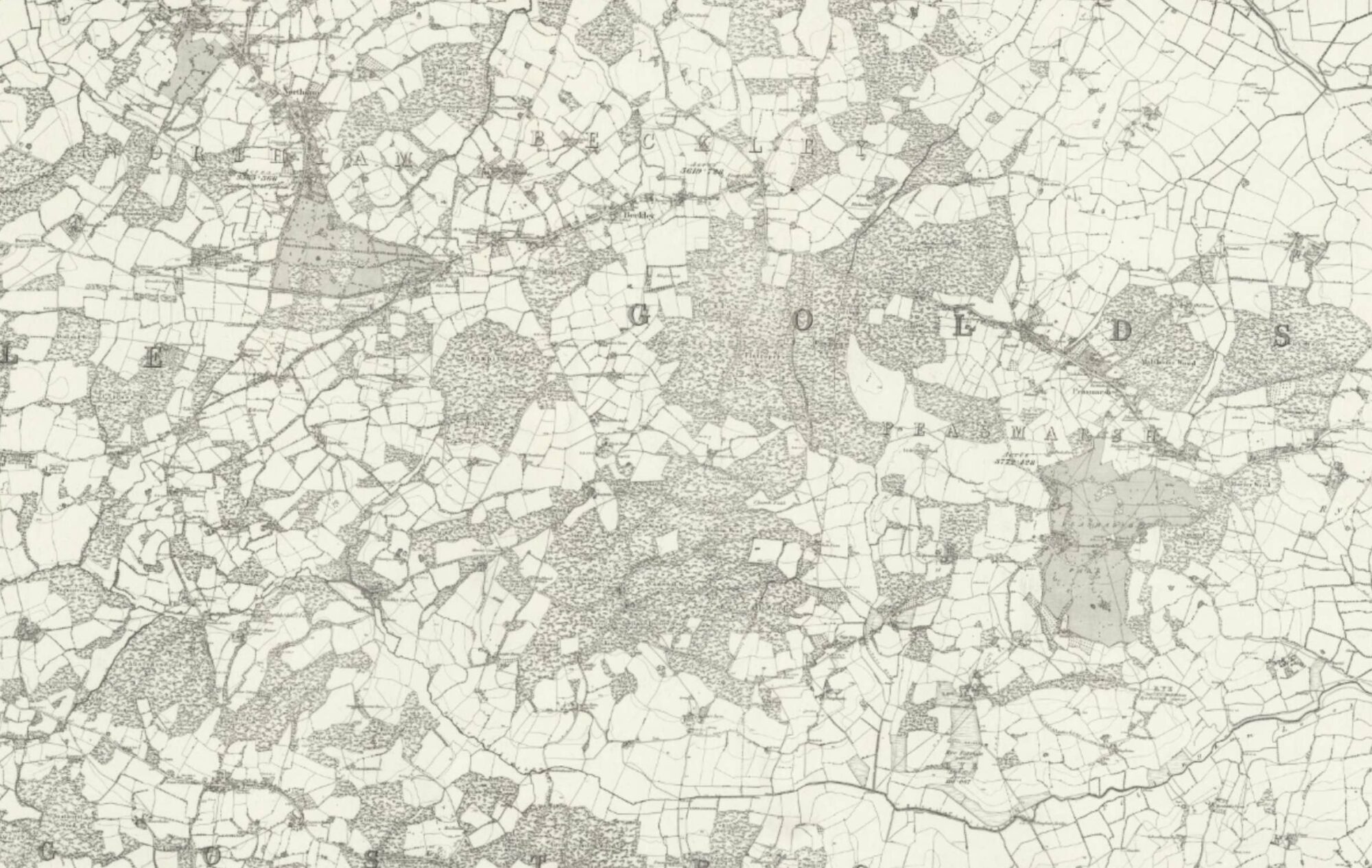The bungalow needed masses of work to be done, as obviously reflected in the price we paid for it. So we spent three months in various layers of chaos, with teams of workers all over the place during that time, painting inside and out, fitting new carpets and new curtains throughout, installing new kitchen equipment, changing the boiler (the old one literally fell to bits the day it was serviced), loft insulation, cavity wall insulation, and several happy (?) days spent clearing drains – oh, it was all great fun. But when complete, the place had taken on a new shine – all of it, 3 reception, 4 bedrooms, 2 bathrooms, study, utility and all mod cons. I think we spent about £25,000 on it but it certainly paid off when we sold four years later. Yes, we were there only four years: it was a short interlude in Norfolk. This was our 26th home. At the end of all the work, we flew off again to Spain to stay with Ken and Andree on the Costa del Sol. The expatriates were well and flourishing in the sun. We saw the beautiful cities of Granada and Seville whilst we were there; and you can guess what we tasted when we visited Jerez.
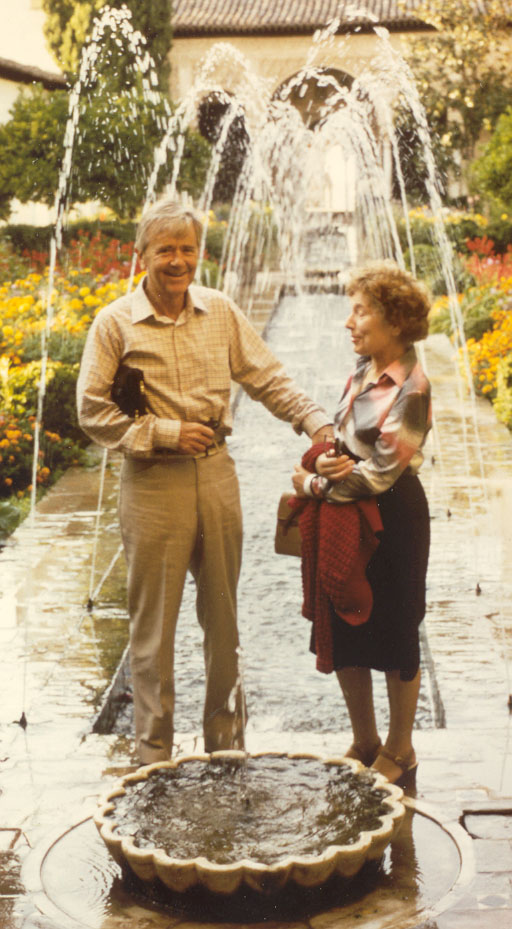
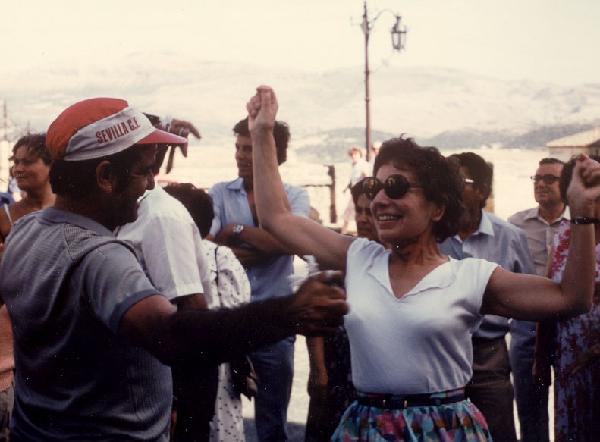
Saxlingham Nethergate was a very small village with a very long name. It was 8 miles south of Norwich. It had one little shop and no pubs. There were some very good people living there. There was a church with a nice atmosphere which interested Pat. She helped with the flowers in the church. The friendly atmosphere in the village culminated in late autumn of each year with a “travelling buffet” for which different households were responsible for different courses of the meal. I remember we did the starters for one such occasion.
We chose to live a fairly quiet life in Saxlingham. I still drove to Harpenden once a week to assist Ross in his Eurostudio activity. In fact it was a particularly interesting period for me because the Personal Computer was beginning to take the commercial world by storm and I entered the PC era myself with my first IBM model. I remember it had facilities for two floppy drives with 180 Kilobytes on each; the RAM was 16Kilobytes; and the speed of the PC was 4.7 MegaHertz. (These words are being printed on equipment with a hard disk of 120 Gb, RAM of 1 Gb, and at a speed of 3.2 GHz.) Anyway, the point was that I was able to keep ahead of Ross’s staff at Eurostudio and advise them on operating problems. Soon after he had installed the Company’s PCs he was able to upgrade to a Hard Disk – the big advance in technology carrying at that time all of 10 Megabytes.
With the very large bungalow, we were well able to welcome family – Peter and Tricia with their two children James and Catherine; Richard and Sue with the beginnings of their family – Graham was born in 1985 and Julia a couple of years later; Pat’s parents of course were frequent visitors until age took its toll; Pat’s brother Ray and his wife Jane; my brother Ken who was eager to advise on colour schemes in the initial redecorating phase; cousin Joan and her husband Doug; Alan Clark and Barbara from Eastbourne; old chums from the States and Canada again; and – surprise, surprise – Pat’s sister Betty and husband Simo came from South Africa for a few weeks, a most nostalgic get-together. Richard, by the way, had completed his tortuous path to fully-fledged Actuary and thus had MA FIA after his name, which is always good for a laugh.
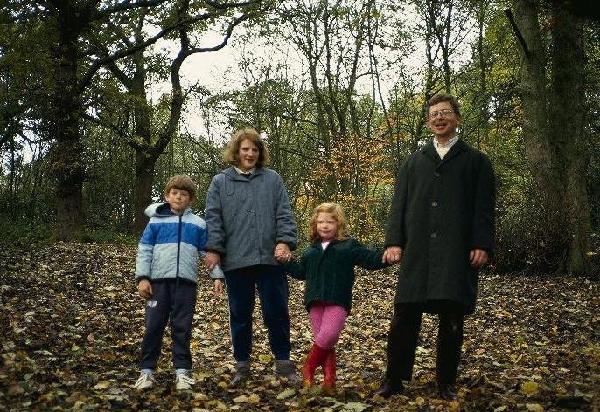
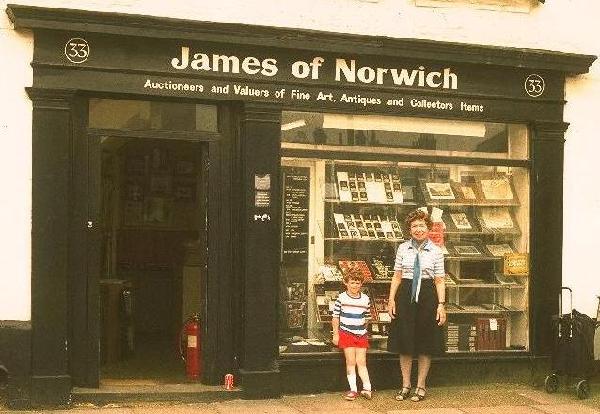
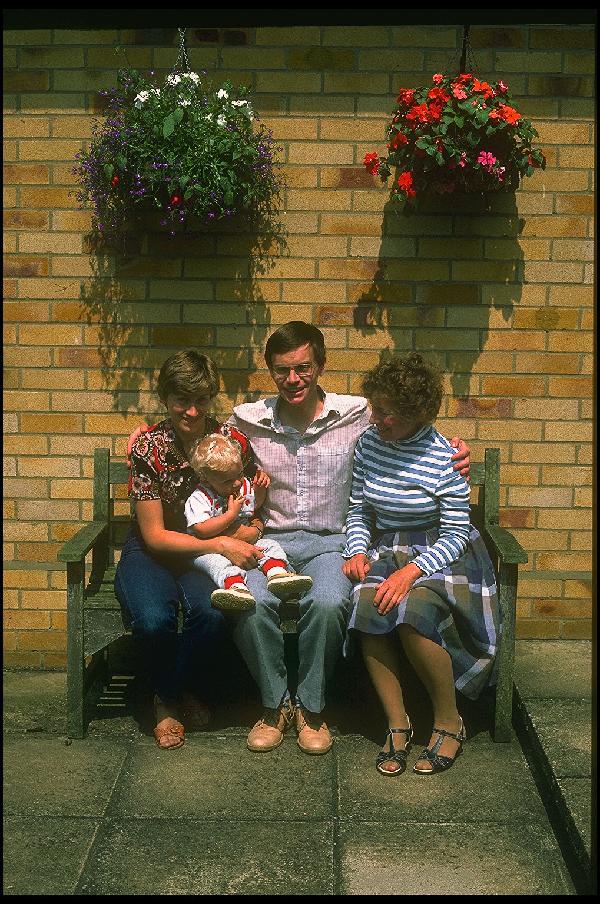
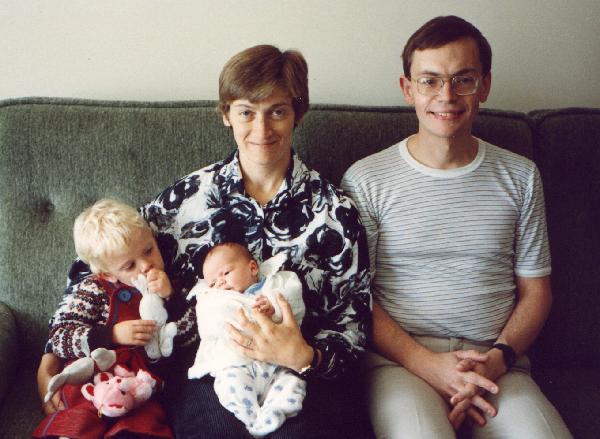
I haven’t mentioned Jonathan. He had followed his brother Richard into Churchill College at Cambridge reading philosophy and spent most of our time at Saxlingham there. I used to pick him up by car at Cambridge for holidays and return him for the new term. Sometimes a girl friend would accompany him. He warned us just before one of the holidays that we shouldn’t be surprised at his appearance: he had had all his hair shaved off for a Charity and he appeared before us as bald as Kojak; a worthy aim. During one of the summer breaks he flew off to Boston and took a number of jobs, some at Harvard, and I was grateful to our good friends from Dayton the Duffys for accommodating him and his friend Isabel for a period. He took part in a demo in London to protest against higher parental contributions to University grants: whilst his father applauded his aims, he was a little less enthusiastic about his methods. Jonathan finished his time at Churchill with a very good 2:1 and took off for London to pursue a succession of interesting jobs in finance and publishing before returning to academia – for lower reward but greater satisfaction.
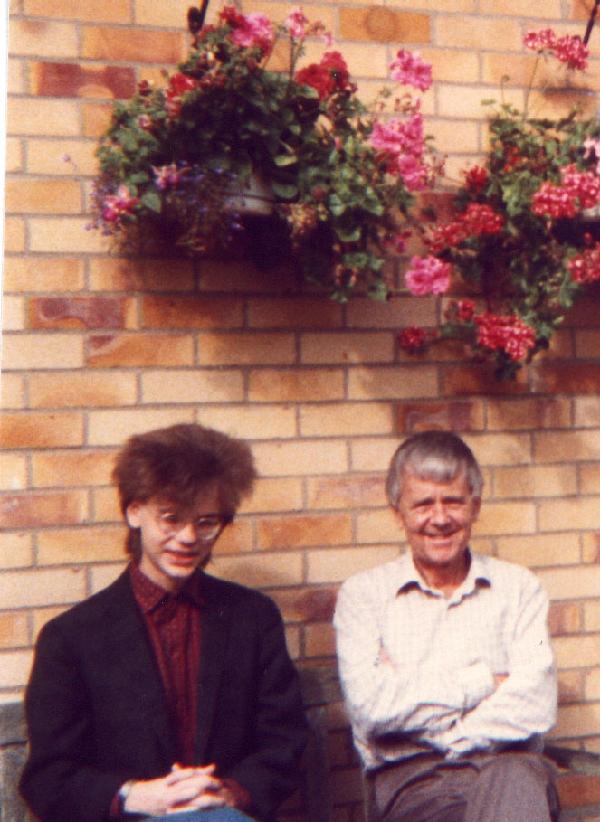
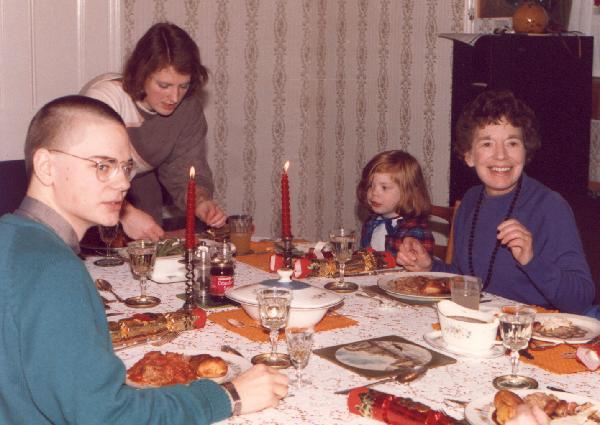
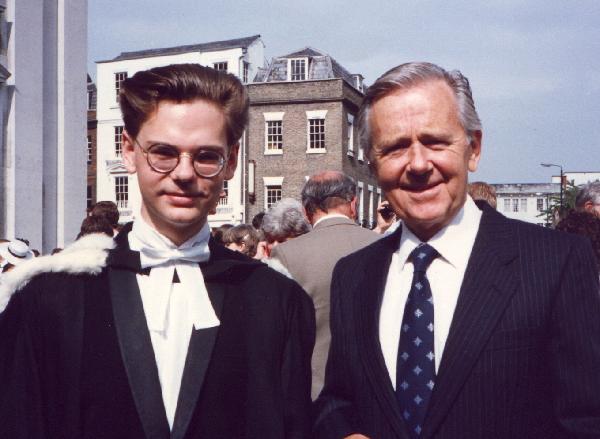
Pat and I were frequent visitors to Norwich’s splendid Theatre Royal for plays, recitals and operas, including a number of pre-London runs. We continued going up to the big city from time to time to attend shows and Foyles’ Literary Luncheons. We saw Evita again (the whole thing this time), A Chorus Line, Noises off, Oliver! and many others. But the most memorable evening was with Michael Crawford in Lloyd Webber’s The Phantom of the Opera. We have rarely left a theatre on such a high as that show gave us. It was truly wonderful; it is still running 20 years later. I could never understand the denigrating comments, particularly of plagiarism, that ALW attracted to himself. There is something in the British character that is suspicious of success… I represented our village in a Norfolk quiz competition run by the local Conservatives. We travelled a bit – Cheddar, Dorset several times, Eastbourne (to the Clarks – including another Speech Day prize-giving), Stratford and Shakespeare country; and a very pleasant couple of weeks driving down to Argeles sur Mer in Southern France with a very good look at the Pyrenees.
But our chief concern about this time was for the state of health of Pat’s parents. Her mother, whom we called by her affectionate nickname Did or Diddy (she was actually Olive May), suffered in mid-1986 from a severe brain haemorrhage and collapsed. She was rushed to hospital and lie in a coma for a month. The drip feed finally brought her round and she spent the rest of her life – nearly a further four years – bed-ridden or chair-ridden in a Norwich nursing home. It was sad to see her in this condition for so long. She had been active and positive for all of her 85 years up to the point of her collapse. In retrospect it would have been good for her to have passed away peacefully at that point. The year 1986 took further toll: Dick, Pat’s father, although still reasonably active both mentally and physically, died in the same nursing home on the last day of the year. He had lived 91 years, having experienced four years of trench warfare in World War I.
Our last full year at Saxlingham – 1987 – was marked by two exciting extremes of weather. January brought a very cold period: heavy snow and ice were widespread and our village was cut off for about a week. And in October – coinciding interestingly with a stock market “crash” – a depression of near hurricane force swept through south east England from the Channel to the North Sea. Its centre hit us about 5 o’clock on the morning of Monday 19th October. The intense noise of the wind and heavy rain woke me up and I looked out to witness a tragic occurrence. In addition to the other 11 million trees which were lost, the storm brought down a massive oak just across the road in front of the bungalow and, we later discovered, others immediately behind us. Strange to say, but the bungalow seemed more vulnerable from that date, which served to confirm a decision which we had taken a few days previous to the storm.
What had happened was that we’d paid a visit to the Clarks in Eastbourne – my old school chum, the Headmaster, for whom I’d now performed four times on Speech Day – and I had spotted an advertisement for a luxury apartment on the sea front just below the approach to Beachy Head. There was something about the ad which propelled us to go and look at it. We liked it immediately and decided, there and then, that we should make it our 27th home. When we returned to the village, we put the bungalow on the market and it was snapped up very quickly at more than twice the price we had paid for it. Well, we had worked hard on it.
We agreed a completion date in January 1988, and set in motion the familiar routine of packing up, settling things, solicitors, agents, removal – you know how it is. Since Pat had been a member (and helper) of the local church and I had kept my non-believing distance, I sent a cheque to the local vicar, leaving the payee line for him to fill in: we had no acknowledgement. I completed work for Ross Kennedy in Harpenden and left him to his own devices.
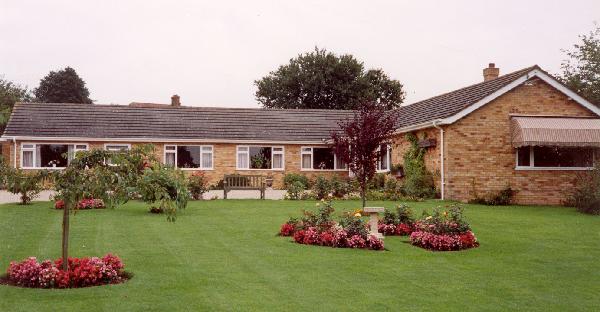
I little knew then that Eastbourne was to present me for nearly ten years with the busiest period of retired life.
